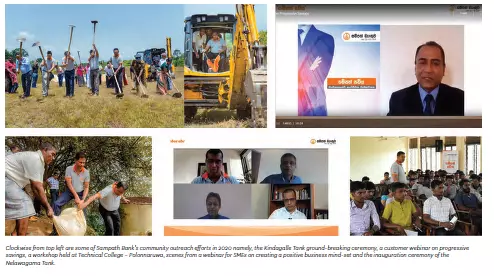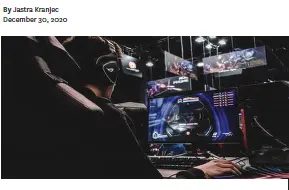
Sampath Bank carried out several sustainability initiatives throughout 2020 aimed at community development, environmental protection and helping individuals and small businesses recover from the negative impacts caused by COVID-19. During the challenging year, the Bank was not only able to deliver on its ongoing commitments but initiated new projects to help revive the nation. Key among these projects was the continuation of its ‘Wewata Jeewayak’ program, commenced in 2001 as a part of its community capacity-building initiatives. It also hopes to promote organic farming as a viable means of maintaining a sustainable livelihood through agriculture. The project contributes to the Bank’s triple bottom line as it enriches the lives of the community in the area, improves the water capacity of the tank and develops the surrounding eco-system, and empowers agri-entrepreneurs by making them financially inclusive. During the year 2020, the Bank undertook two tank restoration projects under the program. The first was to restore the Kindagalle tank located in Kokunnewa area of Bibile in the Monaragala district, which has a surface area of 15 acres and currently provides water to 62 acres of paddy land, benefitting 60 farmer families. Post restoration, the tank will supply 262 acres of farming land with water, thereby directly benefiting 260 families. The restoration work includes excavation of the tank and rebuilding of the tank bund and spill, all of which is being carried out under the supervision and technical expertise of the Agrarian Development Department in Monaragala. The second tank on which restoration work began was the Nalawagama Tank located at Nalawa village, Nochchiyagama in the Anuradhapura district. The tank has a surface area of 175 acres and currently provides water to 210 acres of paddy land, benefitting 175 families. Under the restoration, the tank’s sluice gates were completely replaced as this was identified by the Bank as an urgent need. Before the restoration, the only way in which the gate could be opened or closed involved diving into over 10 feet of water at great risk to the farmers’ lives. In response to the pandemic, Sampath Bank partnered with the CBL Group and WSO2 and jointly donated a PCR laboratory to the Army Hospital in Colombo at a cost of approximately 32 million rupees. The lab has a testing capacity of 600 samples per day, thereby expanding the national capacity to conduct PCR tests. The Bank also conducted webinars under its ‘Sampath Saviya’ entrepreneurship development program to offer advice to SMEs on how best to recover from the impact of the pandemic as well as to the undergraduates of the Rajarata University of Sri Lanka to help convert job seekers into job creators. This was in addition to the Bank conducting workshops for students and career guidance officers of technical colleges that fall under the purview of the Department of Technical Education and Training, as well as a webinar for its customers on progressive savings and financial knowledge for everyday life. In line with its commitment to environmental consciousness, Sampath Bank published its Integrated Annual Report for 2019 as a carbon neutral product by offsetting its carbon footprint of 20.58 tCO2e via the purchase of United Nations Certified Emission Reductions (CERs). Sampath Bank’s ongoing Biodiversity Conservation Project, initiated in 2018 aims to set up a biodiversity baseline and management plan to restore a degraded forest patch of one hectare in Halgahawala, Opatha and revive the surrounding ecosystem. This five-year project is operationalized through a memorandum of understanding between Sampath Bank and Biodiversity Sri Lanka (BSL), with technical inputs from the International Union for Conservation of Nature (IUCN) and the Forest Department of Sri Lanka.





